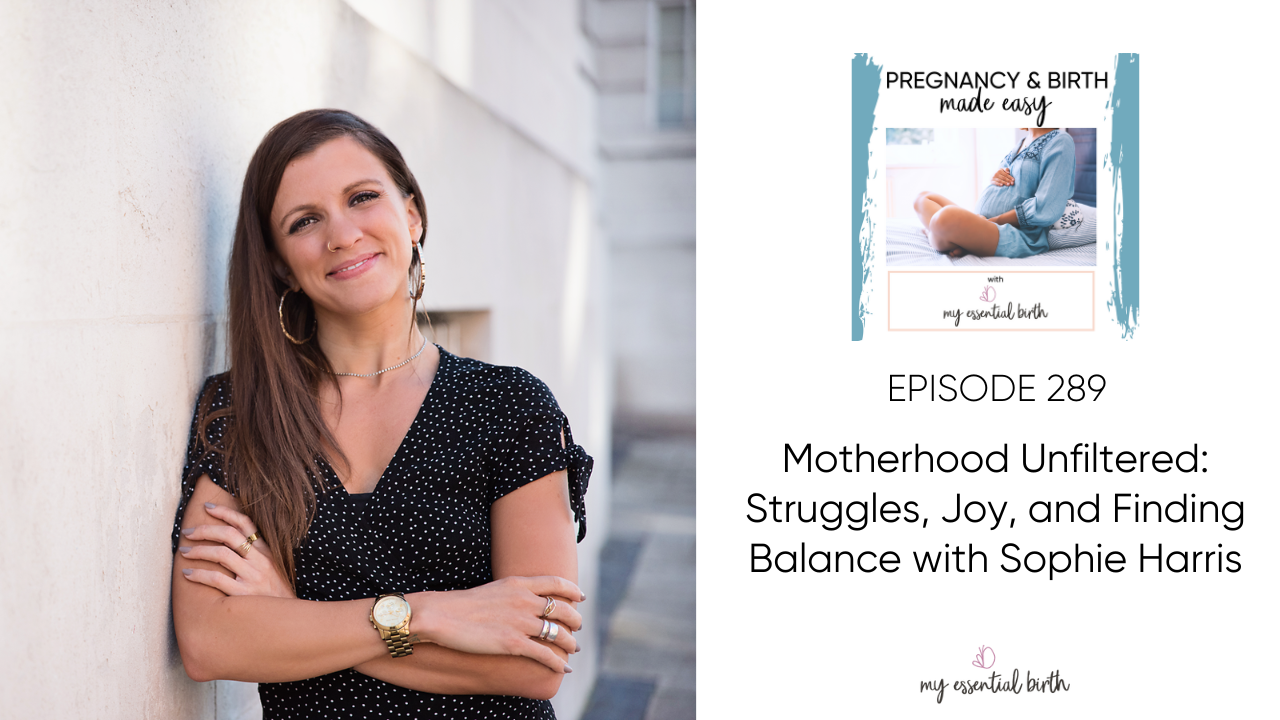Motherhood Unfiltered: Struggles, Joy, and Finding Balance with Sophie Harris

Show Notes:
[1:41] Our Reviewer of the Week, Jo-Shanks, said: "I listened to this podcast before getting pregnant and all throughout my pregnancy journey. At my 36 week appointment, things changed very fast for me. I went from one slightly elevated blood pressure reading at 35 weeks to my midwife telling me I most likely would be induced the next day at my 36 week appointment. I credit this podcast with all the knowledge I walked into that induction with. I was able to consent to certain procedures with confidence and deny others. I was indeed induced the next day and less than 48 hours laster our daughter arrived. I did the daily exercises and truly believe that flipped out girl and got her in optimal position. Next baby I am not procrastinating and will be taking her course!"
[2:31] Sophie Harris is a pregnancy and postpartum psychotherapist and founder of Looking After Mum. Sophie has worked with hundreds of mums to manage feelings of overwhelm, anxiety and low mood to feel confident and content in motherhood. She is passionate about supporting new mums through the complexity of early motherhood; this includes both the beautiful moments and the difficult and painful times too.
[4:53] Postpartum is often defined as the first year after birth, but in reality, the transition into motherhood lasts much longer. Many moms find themselves wondering why they don’t “feel better” months or even years later. This stage is more than just a timeframe—it’s a complete shift in identity, emotions, and relationships.
While some mothers seem to transition smoothly, many struggle with a mix of love, exhaustion, joy, and identity loss. Social media often highlights the best moments, making those who are struggling feel even more isolated. It’s important to recognize that motherhood comes with highs and lows, and feeling overwhelmed doesn’t mean failure. If you’re feeling disconnected, know that you’re not alone. The postpartum experience is unique for everyone, and it’s okay if it takes longer to adjust. Let’s normalize the full spectrum of emotions and embrace the reality of motherhood beyond the highlight reel.
[10:27] How do people find Sophie or people like her?
[13:39] Motherhood is a constant evolution—who we think we’ll be as parents often shifts as we go. There’s no set playbook, and every child, every season of life, brings new challenges and adjustments. One of the biggest foundations for a healthy postpartum experience is learning to prioritize yourself. Many moms struggle with burnout, guilt, and resentment because they put themselves last. Giving yourself permission to meet your own needs—whether it’s proper nutrition, movement, rest, or even a simple shower—can make all the difference.
Neglecting self-care often leads to imbalance in relationships, especially when partners continue their routines while moms feel they must sacrifice everything. Breaking this cycle not only benefits your well-being but also strengthens your role as a mother and partner. Prioritizing yourself isn’t selfish—it’s essential. Taking care of you means you can show up as the best version of yourself for your baby, your family, and your own happiness.
[18:13] How can partners prep for postpartum? Preparing for postpartum as a couple is important, but it’s also crucial to recognize that you can’t predict exactly how you’ll feel once the baby arrives. Instead of making rigid plans, focus on flexibility and communication. One key mindset shift: Your partner will never fully understand what you’re going through, no matter how supportive they are. Instead of expecting them to “get it,” focus on expressing your needs clearly—whether that’s asking for a hug, time alone, or help with specific tasks. Avoid the trap of assuming they should just know. Sharing the mental load is another challenge. Moms often want things done a certain way, but learning to let go of control allows partners to step up and support in their own way.
[21:59] Beyond your partner, having experienced women in your life—a strong community, other moms, doulas, or mentors—makes a huge difference. Motherhood was never meant to be done alone, and building a support system can help you navigate the transition with more confidence and ease.
[24:10] The first few weeks postpartum are an emotional whirlwind—full of ups, downs, joy, exhaustion, and everything in between. It’s completely normal to experience mood swings, moments of doubt, and even feel overwhelmed by the intensity of new motherhood. Increased anxiety is also expected, especially for first-time moms. You’re learning how to care for a tiny human, and with that comes natural worry. However, if feelings of hopelessness, extreme anxiety, or detachment from your baby persist or worsen over time, it’s important to seek support. Signs that you may need extra help include struggling to function, feeling persistently low, or being unable to relax due to overwhelming worry.
Most importantly, it’s okay to acknowledge that motherhood is both incredibly hard and incredibly beautiful. The most meaningful things in life often come with challenges, and embracing both the highs and lows is part of the journey.
[28:10] Question: How can I set boundaries postpartum and what are some good examples? Setting boundaries postpartum is essential but often challenging, especially with family and in-laws. Many new moms struggle with the fear of not being liked or upsetting others, but it’s important to honor your needs during this sensitive time. One of the most common boundary issues is around visitors. If you need a week or two to adjust before having guests, that’s completely valid. Communicate your boundaries with kindness but firmness—acknowledging their excitement while reinforcing what’s best for you. For example, you might say, “We’re so excited for you to meet the baby, but we need a little time to settle in first.”
[30:44] Question: What if I feel fine soon after and if I want to go outside and do things? If you feel ready to get out of the house soon after birth—go for it! There’s no right or wrong way to navigate postpartum, and every mother has different needs. Some moms feel best staying home and soaking up every moment with their baby, while others need outings or solo time to maintain their emotional well-being. Cultural norms and societal expectations can shape our postpartum experience, but ultimately, what works for you is what matters. Studies and personal experiences show that moms who engage in activities outside the home—even if they wish they had more time with their baby—often feel more emotionally balanced. This highlights how unnatural it is to raise a baby in isolation, without the support of a community.
Connecting with other moms, whether through La Leche League, postpartum groups, or just casual meet-ups, can make a world of difference. Sharing experiences, supporting one another, and simply being in the presence of others on the same journey can be incredibly uplifting. Motherhood isn’t meant to be a solo experience—finding your people can make all the difference.
[34:22] Question: How do I support my friend who had postpartum depression when I didn't? Supporting a friend struggling with postpartum depression or anxiety—even if you haven’t experienced it yourself—starts with listening. Avoid giving advice unless asked, and never compare your experiences to theirs. Every baby, every postpartum journey, and every person’s background is different, and factors like childhood trauma can make postpartum uniquely challenging for some moms. Validation is key. Acknowledge their feelings, reassure them they’re not alone, and ask how you can help. Small acts of kindness, like bringing over a meal or offering to accompany them to an outing they’re anxious about, can make a big difference. Most importantly, be patient. Postpartum struggles don’t have a quick fix, and your support means more than you may realize. Simply showing up, listening, a d offering practical help without pressure can be one of the greatest gifts you give a new mom in need.
[36:13] Sophie's words of encouragement: "You are doing so much better than you think you are. The tough moments are completely normal, and even when it feels like you’ll never feel like yourself again—you will. It takes time to adjust to this massive life transition, but things do get easier. If you’re struggling, know that you’re not alone. Many moms have wondered if they’d ever feel okay again, and they do. And on the other side of the hard days, life feels even sweeter. You will get there, one step at a time. Keep going."
[37:28] Freebie from Sophie! This Mood Booster Journal is designed to support you through the ups and downs of postpartum. It includes thoughtful questions to help you focus on the positives and set daily intentions for how you want to feel. I hope it brings you support and encouragement!
[38:17] Where to find Sophie and how to connect with her:
To Leave a Review ⭐️
- Open Apple Podcasts
- Find “Pregnancy & Birth Made Easy” podcast
- Select “Ratings and Reviews”
- Click the stars!
- Select “Write a Review” and tell us what was the most amazing, comforting, eye-opening thing that you loved!
ALL the best,

Links Mentioned:

